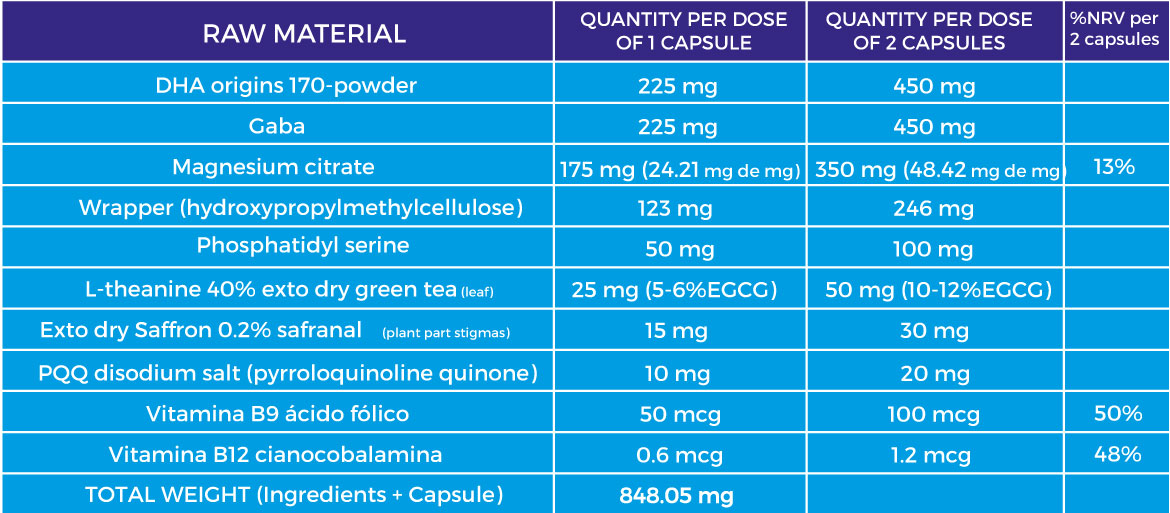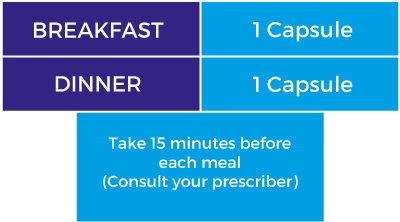![]() aids in the use of all types of pathologies related to anxiety, depression, and generally all those related to good cognitive function. Its specific and essential components, combined with an appropriate formulation, effectively help alleviate these disorders.
aids in the use of all types of pathologies related to anxiety, depression, and generally all those related to good cognitive function. Its specific and essential components, combined with an appropriate formulation, effectively help alleviate these disorders.
QUALITATIVE COMPOSITION

DOSAGE
The optimal dosage has been determined to be the intake of 2 capsules daily, providing the ideal amount of the 9 elements that make up the formulation’s composition to achieve optimal results.


COMPONENT PROPERTIES
PQQ (Disodium Salt ) Pyrroloquinoline quinone
-PQQ actively participates in the proper functioning of the immune system, enhancing brain oxygenation. This explains the improvements related to cognitive capacity, degenerative diseases, and metabolic disorders.
-It is the only known substance that “stimulates” “mitochondrial biogenesis,” meaning the formation of new mitochondria.
PROPERTIES
-Cardioprotective.
-Improves sleep quality without causing drowsiness, helping to reactivate cognitive abilities and preventing the reduction of brain capacity in elderly patients, especially regarding attention and working memory.
-Antioxidant, protecting the mitochondria that provide energy to cells.
-Preclinical and clinical evaluations indicate that PQQ has a wide range of clinical applications. PQQ supplementation can be particularly useful in problems caused by decreased mitochondrial function or increased oxidative stress.
CWith high anti-inflammatory power, it can be used to treat inflammatory diseases. Additionally, organs such as the liver, muscles, eyes, and skin are susceptible to oxidative damage and can therefore be treated with PQQ.
Cognitive Decline.
PQQ can be used to prevent cognitive decline, but also to treat it. In 2016, a placebo-controlled randomized study showed that cognition significantly improved after a daily supplementation of 20 mg of PQQ for two weeks, especially in cases with low memory scores. A more recent study also revealed that PQQ supplementation leads to improvements in memory and speech, thanks to increased blood supply and oxygen levels in the prefrontal cortex.
Animal studies had already demonstrated that PQQ protects the brain against neurodegeneration and cognitive decline, protecting it from oxidative stress and resulting damage. Recently, it has been shown that PQQ also protects the brain from neurotoxicity due to excessive glutamate production.
When cognitive decline is severe enough to result in Alzheimer’s disease, PQQ supplementation can be very valuable. The increase in brain plaques formed by the accumulation of beta-amyloid proteins can cause mitochondrial dysfunction, which is currently also considered a trigger for Alzheimer’s disease.
In Parkinson’s disease, mitochondrial dysfunction seems to be behind many neurodegenerative diseases, including Parkinson’s. This disease is characterized by the loss of dopaminergic neurons in the midbrain. Mitochondrial dysfunction, associated oxidative stress, neuroinflammation, and disruption of autophagy appear to be the main causes of neuron loss.
In vitro and animal studies have already shown that PQQ supplementation inhibits neuroinflammation and stimulates autophagy, thus protecting against (subsequent) neurodegeneration. PQQ improves locomotor domain, reduces the loss of dopaminergic neurons in the brain, and maintains the number of mitochondria within it.
In epileptic seizures resulting from overstimulation of the N-Methyl-D aspartate (NMDA) receptor, this receptor under healthy conditions is involved in learning processes, but if overstimulated, it can cause epilepsy. Stimulation or inhibition of the NMDA receptor is achieved through the reduction and oxidation of the receptor’s redox site.
PQQ can influence this redox site, preventing overstimulation of the NMDA receptor without affecting normal functions such as learning processes. In vitro and in vivo studies have shown that PQQ can significantly reduce the number and duration of seizures.
Mitochondrial dysfunction is behind metabolic disorders such as insulin resistance and type II diabetes. PQQ supplementation prevents and restores this mitochondrial dysfunction. Animal research in 2015 demonstrated that PQQ supplementation improves type II diabetes parameters, such as blood sugar levels, insulin levels, triglycerides, and total cholesterol, preventing many cardiovascular problems in diabetic patients.
STUDIES:
Huang et al., 2019. Effects of PQQ Supplementation on Aerobic Exercise Performance and Indices Of Mitochondrial Biogenesis in Untrained Men. J Am Coll Nutr 20:1 – 10; doi: 10.1080/07315724.2019.1705203
GABA (GAMMA-AMINOBUTYRIC ACID)
Gamma-aminobutyric acid is a non-protein amino acid naturally present in bacteria, plants, and vertebrates. It functions as a neurotransmitter and can act on the nervous system through the gut-brain axis. Both acute and chronic stress, as well as anxiety disorders and sleep disturbances, are regulated by these neurotransmitters that regulate the “brain circuits” in the amygdala to modulate stress and anxiety responses under both normal and pathological conditions.
BENEFITS PROVIDED BY GABA
-Enhances self-esteem.
-Improves problems of anxiety, insomnia, and stress. GABA’s properties help transmit information to our neurons to aid in relaxation and concentration.
-Helps “slow down” our nervous system activity to induce a relaxed state that allows us to fall asleep.- Refuerza el sistema inmunológico.
-Strengthens the immune system.
-Controls “fear” situations; when neurons become overexcited in panic situations, GABA reduces neuronal activity, helping us control the situation.
-Boosts growth hormone.
STUDIES:
ncbi.nlm.nih.gov/pmc/articles/PMC7527439
DHA (DOCOSAHEXAENOIC ACID)
DHA is an omega-3 fatty acid found in its highest concentration in nervous tissue. It has been proposed that DHA plays an important role in the formation and function of the nervous system, particularly in the brain. It acts at the level of cell membranes regulating their metabolic functions and also at the level of gene expression related to brain function.
PROPERTIES:
-Regulates apoptosis processes that are crucial for neurogenesis.
-Plays an important role in the proper functioning of the brain and nervous system.
-Literally acts as a “poison” against cancer cells.
-Has a positive action in type II diabetes, limiting the risk of insulin resistance.
-Helps in resistance to oxidative stress.
STUDIES:
ANSES REPORT
https://www.anses.fr/fr/system/
-UNIVERSITY OF CHILE, SciELO ANALYTICS JOURNAL (2004) INSTITUTE OF NUTRITION AND FOOD TECHNOLOGY. JULIO SANHUEZA, SUSANA NIETO, AND ALFONSO VALENZUELA
MAGNESIUM CITRATE (C6H6MgO7)
– Assists in the rehabilitation of bone problems.
-Excellent for achieving sleep without many side effects (nightmares) as can occur with Melatonin.
-Helps regulate blood pressure and prevents cardiovascular problems.
-Strengthens the metabolic system; when our neurons receive the correct amount of Mg in salt form, cognitive function develops optimally.
-Strengthens the immune system.
-Necessary for the synthesis of numerous proteins.
-Helps regulate blood glucose.
-Helps prevent stress and promote relaxation, offering greater tolerance to both.
-Stimulates the synthesis of neurotransmitters (endorphins), promoting a sense of emotional well-being.
-Participates in collagen synthesis present throughout our body
STUDIES:
Lamberts.es/art-dsp/se-comprueba-la-mayor-biodisponibilidad-del-citrato-de-magnesio-frente-aotras-preparaciones-de-magnesio/
PHOSPHATIDYLSERINE
It is a phospholipid that usually remains in the inner lipid monolayer of cell membranes thanks to an enzyme called flippase. It is a vital phospholipid for brain cells.
PROPERTIES:
-Improves memory, concentration, and learning abilities.
-Participates in neurogenesis.
-Stimulates the production of acetylcholine, helping to eliminate damaged brain cells and acting as an antioxidant to protect the brain.
-Contributes to normal cognitive function.
-Stimulates the brain to produce dopamine.
-Decreases cortisol levels and increases communication between brain cells (synapses) by increasing the number of membrane receptor sites for message reception.
-Allows brain cells to metabolize glucose, which is then released and binds to neurotransmitters, crucial for learning, memory, and other cognitive functions.
-Relieves depression by improving mood; adding DHA amplifies the benefits of phosphatidylserine.
STUDIES:
examine.com/supplements/phosphatidylserine/
CROCUS SATIVUS (Saffron)
The stigmas of the saffron plant (Crocus Sativus) contain numerous compounds with medicinal properties. One of its compounds, colchicine, has recently been studied for its potential against Covid-19.
PROPERTIES:
-It has been shown that doses of 30mg per day, morning and night, are effective in treating mild depression, according to studies published and attached in this document, matching products used in more severe treatments (Prozac).
-Antidepressant.
-Protector against toxins, protecting body tissues (brain, heart, liver, kidneys, and lungs) from natural or artificial toxic compounds.
-Improves cognitive abilities and memory in people suffering from Alzheimer’s, with benefits similar to drugs but without side effects.
STUDIES:
-Progress in Neuro-Psychopharmacology and Biological Psychiatry.
-pubmed.ncbi.nlm.nih.gov/30036891
L-THEANINE
L-Theanine is a non-protein amino acid naturally found in tea leaves (Camellia Sinensis), mainly in green tea. Being a unique amino acid, it has the ability to cross the blood-brain barrier, meaning it can reach the brain and exert effects on the central nervous system. Consumed as a supplement, it has calming and relaxing properties without causing drowsiness.
It affects the levels of certain neurotransmitters such as serotonin and dopamine, improving our mood, sleep, and emotions, influencing cortisol levels (the stress hormone) and helping us feel better.
PROPERTIES:
-Protects the brain against cellular stress induced by toxins or oxygen deprivation (ischemia).
-Can enhance alpha wave activity in the brain, leading to improved concentration, memory, focus, and creativity.
-Has relaxing properties without causing drowsiness, reducing stress and anxiety by increasing levels of GABA and other neurotransmitters such as serotonin and dopamine.
-Lowers blood cortisol levels, the stress hormone.
-Reduces blood pressure in stressful situations.
-Strengthens the immune system.
STUDIES:
www.thesleepdoctor.com
VITAMIN B12 (CYANOCOBALAMIN)
Vitamin B12, like other B-complex vitamins, is important for protein metabolism, helps in the formation of red blood cells, and maintains the nervous system.
PROPERTIES:
-Necessary for DNA synthesis, energy production, and proper functioning of the nervous system.
-Vital for the functioning of the brain and nervous system.
-Actively participates in cognitive function.
-Prevents cognitive anomalies.
STUDIES:
Ods.od.nih.gov/factsheets/VitaminB12-healthProfessional/
VITAMIN B9 (FOLIC ACID)
Essential vitamin for the formation of red blood cells and the healthy growth and function of cells.
PROPERTIES:
There is evidence that folic acid can help in the treatment of depression.




